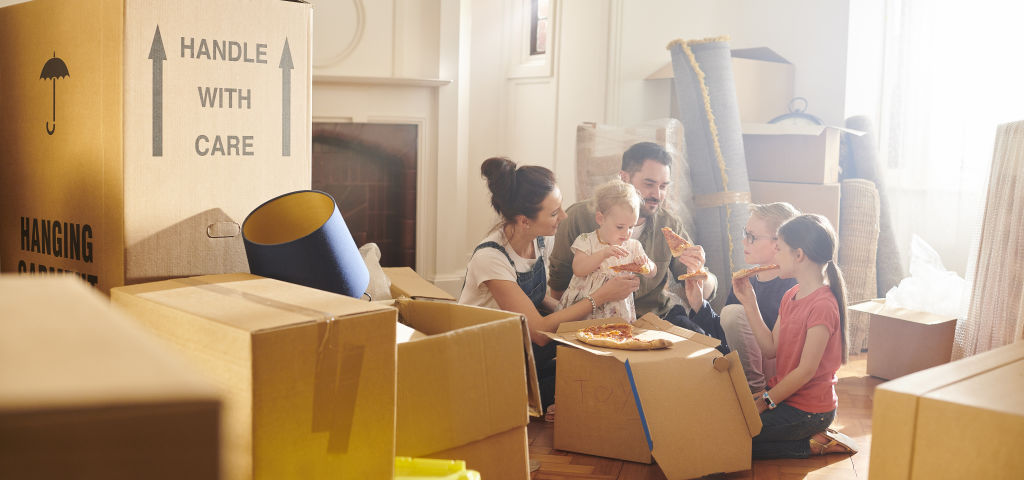Moving house can be tough on kids, here's how to make it easier

Moving house is a stressful time for most families.
You’ve hired your real estate agent, packed up your belongings and arranged movers for your relocation, but have you considered how your children might be handling the change?
Research from the University of Otago has found that moving house was linked with emotional and behavioural difficulties in four-year-olds. Problems compounded with every house move.
Find out how three generations live on the one property on Somewhere Else:
Keeping kids stable and happy during what is an unsettling and stressful time for most families involves keeping positive, preparing them for change and keeping an eye out for warning signs.
Prepare them ahead of time
Registered Educational Psychologist Angela Neville said transitions could be unsettling for everyone but particularly children who needed a “safe base” to feel secure.
“It is important to prepare children for the move ahead of time, so they have time to get used to the idea and have the chance to have their questions answered and any concerns addressed,” Neville said.

She warned against keeping details from children in the hopes that they wouldn’t dwell on the situation ahead of time.
“This can easily evolve into trust issues, and even trauma,” she said.
Let them feel their feelings
Home and Family counsellor Heather McKain said while there would be a justifiable grief in the loss of relationships, the experience of a big move could be an opportunity too.
“Support children through this natural process. Relationships change, and friendships are lost and gained throughout life. So a move can be an opportunity to teach children about self-care and how to be supported and support themselves through these types of change.”
Be positive
Neville said as long as parents and caregivers kept talking about the positive aspects of the move and answering any questions that children might have, then children should feel more secure and upbeat.

“It is likely that they have some worries about how it will affect them; will they need to change schools? Will they like their new school? Will they be able to make friends? Will they be able to keep in touch with old friends? What will happen to their pets?”
She said it might be a good idea to write a journal or gratitude diary to record positive things that have happened in their life and to be grateful for all the small things that often get taken for granted.
Get children involved
Neville said children should be involved with packing and downsizing their possessions ahead of the move.
“Talk to them about selling some toys, or donating to the less fortunate. Ensure they are able to hold on to one or two treasured toys so they will still have something that they are attached to in their new environment,” she said.
Neville also suggested selling or donating children’s bedroom furniture and getting them involved in choosing new items for their new room.
“This will not only make the logistics of the move easier, but will also give them something to look forward to, the anticipation of being able to help choose new bedroom furniture and decide how their new room will be set up,” she said.
Look out for warning signs
Some children might not cope well with the transition.
Neville said typical warning signs included appearing sad or withdrawn, uncharacteristic tantrums or meltdowns, difficulty sleeping or seeming distressed in spite of all reassurance.
“Generally, younger children tend to cope better with transitions than older children or teenagers, however this depends on the individual, how resilient they may be and how much support they receive,” she said.
One-on-one time is king

McKain said any time spent with children during difficult times was so important.
“One of the best ways to support children through any difficult time is to spend one-on-one time with them. Even if it is only 10 minutes a day. This communicates care and support immensely. Feel free to play, read a book, go for a walk or a bike ride, it doesn’t need to be structured time to talk about feelings.
“If they want to talk, that’s OK, but you can just take a break to have fun,” she said.
Keep in touch with old friends
If your children are older, they may have developed longer relationships with their friends.
Neville said it was important to reassure them that good friends will often keep in touch even if they live far away from each other.
“They may be able to have their best friend come to stay during the school holidays and can enjoy keeping in touch by telephone, email, Zoom or Facetime at other times,” she said.
- This story originally appeared on stuff.co.nz
We recommend
We thought you might like
States
Capital Cities
Capital Cities - Rentals
Popular Areas
Allhomes
More










